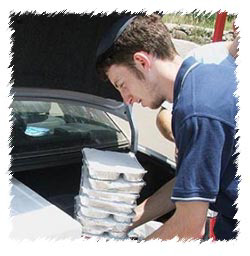July 20, 2006
Katyusha rockets had been falling on Kiryat Shmona long before the arrival of Chabad-Lubavitch emissary Rabbi Yigal Tzippori in 1992. But that didn't stop him from asking permission of the Lubavitcher Rebbe, Rabbi Menachem Mendel Schneerson, of righteous memory, to come to this town on the Lebanese border.
Several other applicants had been turned down by the Rebbe, a fact which leads Tzippori to consider his "shlichut," or mission, in Kiryat Shmona to be a sign. His holy purpose is to raise the spirits of his neighbors and keep their morale high, now more than ever, when the Katyushas are raining down harder than ever before.
With supermarkets closed - Chabad in Kiryat Shmona has been providing more than 1,000 meals daily Towards that end, among other projects, Tzippori has increased the output of his soup kitchen. Normally, the food pantry hands out 300 meals a day. With supermarkets closed these days – almost the whole of northern Israel has shut down since Hizbullah terrorists in Lebanon set off this current wave of fighting with the capture of two Israeli soldiers last week and a constant barrage of rocket attacks – Chabad in Kiryat Shmona has been providing more than 1,000 meals daily.

"The soldiers tell us, 'We were waiting for Chabad to come.'" said Tzippori. "'And look, not just Chabad came, but a Torah too.' Many soldiers asked me to send emails on their behalf to their homes. They were just so happy, they said, 'Heaven sent you.'"
The rabbi said he has been particularly impressed by the determination of the soldiers he is meeting.
They were just so happy to see us, they said, "Heaven sent you." "I've never seen a consensus like this," he said. "Everyone, really everyone, is united in the sense that this will end only when we ourselves decide to end it. If even a tiny remnant remains of Hezbollah in Lebanon, nothing else matters. And, of course, we must bring home the captives."
Tzippori's military background helps him quell his own fears as he drives all over the region, now pockmarked by the craters of rocket fire.
"It's not that the rockets don't bother me," he said, "but that I don't allow them to stress me out. One has to concentrate on moving forward, and on one's purpose. If you get stressed, other people feel it, especially the children.

Living in the shadow of the new Israel-Lebanon war, Tzippori often reminds his neighbors of a blessing given to Kiryat Shmona by the Rebbe more than a decade ago.
"My mission is to comfort these people, to give them a sense that everything will be all right" "Their city is a 'significant city in Israel,'" the Rebbe wrote, using a Talmudic phrase to raise the city's importance. Then the Rebbe quoted verse from the Bible and Psalms that he invoked on many occasions with regard to individual cities, as well as the whole of the country. "G‑d is there from the beginning of the year until the end of the year,' and 'the Guardian of Israel will not sleep nor slumber.'"
Even now the words bring comfort to those who are living in bomb shelters.

Still, the current situation forced Tzippori to send his younger children further south, out of harms way. He explained the move as simply out of a concern "that I can focus on my work, with quiet."
His older daughters have remained in Kiryat Shmona, traveling from shelter to shelter in order to lift the mood of others. Their father is proud of their kind deeds, though he admits that their work has a fringe benefit.
"I don't worry about them as much," he said, "because this way I know that most of the time they are safe in a bomb shelter."






Join the Discussion